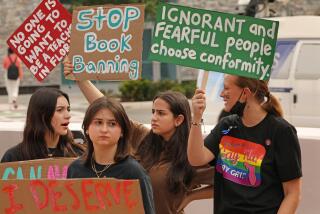‘Thousand and One Nights’ Banned in Cairo
- Share via
CAIRO — A court ruled Sunday that parts of the unexpurgated classic “The Thousand and One Nights” are obscene and ordered 3,000 confiscated copies of a new edition of the book to be destroyed.
The Interior Ministry has confiscated two editions of the work. It charged a publisher and three booksellers with misdemeanor violations of pornography laws over the book, which contains the tales of Ali Baba, Aladdin and Sinbad the Sailor, as narrated by the beautiful Scheherazade to her husband, Schariar, in her bid to escape his death sentence.
The work, said by some scholars to include stories over 1,000 years old, also contains earthier scenes, like the seduction of a poor porter by three young maidens.
Judge Ahmed Hossaini ruled that the unexpurgated versions were obscene and violated public morals. Hossaini said his ruling applies only to the 3,000 copies the prosecutor initially seized and not to any other copies. He said his decision will not set a legal precedent, even concerning the editions he ruled obscene.
The publisher of the two seized editions and two booksellers drew the maximum fine allowed by law, the equivalent of $400. Hossaini also ordered the edition’s printing plates destroyed.
The case caused an uproar among Egyptian scholars and intellectuals, who argue that as a world-renowned classic, the book should not be censored. Several expressed fear that the case could lead to government tampering with other literary works.
Brig. Adli Kosheiri, the Interior Ministry official who instigated the case, contends that “The Thousand and One Nights” is not a classic but, in its unexpurgated version, a threat to Egyptian youth.
“There is no known author for the book,” he said. “Over the years, each publisher has added what he wants to the stories to sell more copies and attract more readers. The book is not part of our heritage, and even if it were, any part of our heritage that includes dirty words should be locked up in a museum and an expurgated version should be made available to the youth.”
Scholars say the stories in “The Thousand and One Nights” are of Persian, Indian and Iraqi origin but have come to be identified in the West with Arabian and Islamic cultures.
Intellectuals concede some parts of the book may be considered racy.
However, Sohair Kalamawi, a professor at Cairo University who wrote her doctoral dissertation on the book, said: “The words on sex constitute less than one-tenth of this book. . . . There are many more graphic details of sex, even homosexual sex, in our heritage of literature and poetry, but it is our heritage and, of course, we will not change it.”
More to Read
Sign up for Essential California
The most important California stories and recommendations in your inbox every morning.
You may occasionally receive promotional content from the Los Angeles Times.










